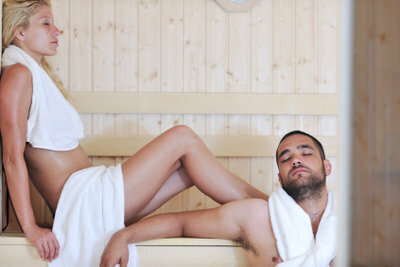Do you sweat at night?
It is particularly bad in the summer months: you sweat at night, so much that your bed is often very wet in the morning. But there are ways you can check so as not to sweat off too much at night.

What you need:
- Mint tea
- Camomile tea
- little nightwear
- Fresh air
Night sweats are often very uncomfortable. You wake up often and the sleep is continuously interrupted. The next morning you are totally exhausted and the beds are completely soaked. This harms your performance during the day and your health on top of that. But what can you do about it?
You don't have to sweat in bed
- Sweating in bed doesn't have to be - unless you are having fun with your partner. But kidding aside. What can be causing your night sweating? Hyperhidrosis, as excessive sweating at night is also known, is a condition that affects over 41% of around 2,000 people surveyed.
- A distinction is made between normal sweating and illness-related sweating. Of course, everyone loses sweat through their sweat glands during the night.
- So if you sweat so excessively that you sweat, despite the correct bed linen and optimal room temperature If you have to change your bedding afterwards, you will almost certainly suffer from nightly Hyperhidrosis.
- Side effects of nighttime hyperhidrosis can be that you see it every day, not just sometimes at night sweating excessively, especially profuse sweating as a young adult and changing clothes several times Night clothes.
- Causes of sweating at night can be: Constant Sweat production without an identifiable medical cause (idiopathic hyperhidrosis), the famous Menopausewhich trigger night sweating in women, bacterial infections such as periostitis or pericarditis, but also an HIV infection and abscesses, Cancer (here it often appears as a symptom if the cancer has not yet been noticed, for example lymph gland cancer), hypoglycaemia - a low blood sugar level in the body, hormonal imbalances or certain Medication, for example antidepressants and pregnancy. All of these causes can trigger your night sweats.
Especially in summer it can happen that people sweat under the covers. …
Avoid hyperhidrosis at night
- Even if it doesn't sound particularly exciting, check your room temperature. It shouldn't be more than 16 to 18 degrees at night.
- Avoid beaver bedding and brushed microfiber bedding that is particularly warm. Thinly combed cotton or satin, which is not liked by everyone because of the slipping of the bed linen, is ideal.
- Wear only a little nightwear, a pair of briefs is enough in bed.
- Avoid heated water beds or, if possible, set the temperature to a maximum of 20 ° C.
- If you can, open the window all the way at night, but you can also tilt the window in an emergency. If you can't open the window, perhaps because of noise, leave the bedroom door open and open the window in the adjoining room to let fresh air into the room - even in winter. The stale air and body vapors must be replaced with fresh air.
- Don't eat anything in the evening that makes you sweat at night. This includes the typical fat roast pork with dumplings. Such foods are very stressful, and when huge amounts of fat are processed, your can body ever break a sweat.
- In the evening, drink a cup of mint tea, which cools you, and a cup of chamomile tea, this has a calming effect.
- During menopause, hormonal progestin therapy, which your doctor prescribes, may help.
- Keep your weight within limits. Set a weight limit that you will never exceed. Too much weight doesn't just make you sweat at night.
- Do not drink alcohol in the evening, it would only increase sweating.
- Do not exercise in the evening and do not go to the sauna in the evening.
- Your dinner should be a light, not too spicy meal, preferably carbohydrate-free. Avoid raw foods.
- Try to have your fluid needs met by 7:00 p.m.
Additional author: Susanna Baumer
How helpful do you find this article?
The content of the pages of www.helpster.de was created with the greatest care and to the best of our knowledge and belief. However, no guarantee can be given for the correctness and completeness. For this reason, any liability for possible damage in connection with the use of the information offered is excluded. Information and articles must under no circumstances be viewed as a substitute for professional advice and / or treatment by trained and recognized doctors. The content of www.helpster.de cannot and must not be used to make independent diagnoses or to start treatments.


